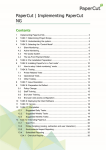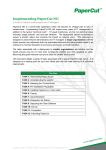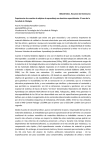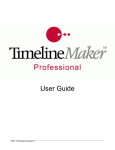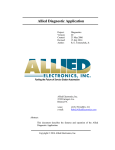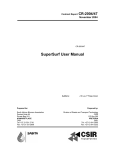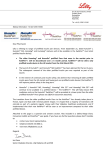Download Dr. Rep. - Medmarc
Transcript
Paging “Dr. Rep.:” Determining the Proper Role of Medical Device Representatives in the OR Z. Ileana Martinez THOMPSON HINE LLP Two Alliance Center 3560 Lenox Road, Suite 1600 Atlanta, GA 30326 Atlanta | Cincinnati | Cleveland | Columbus | Dayton | New York | Washington, D.C. Do you think someone who sells these… 2 should be performing one of these?… 3 Back Then… 4 Today… 5 Value of Sales Reps in the OR Tremendous asset to the surgeon and his team both preoperatively and perioperatively. Extremely knowledgeable about the particular medical device being used. Have observed sometimes hundreds of procedures where the device was utilized. Have the benefit of seeing different surgical approaches and techniques used by multiple surgeons. Know troubleshooting methods surgeons apply. 6 Criticisms of Sales Reps Primarily motivated by financial gain: “They’re not in any way motivated to recommend what might be the best thing for the patient…[t]hey’re there to sell their product.” “At a time when Washington is trying to find new economies in health care, salesmen in the operating room serve as simple reminders that medicine is a business, with all the potential that entails to promote efficiency, boost sales and extract profit.” Reps…“can put the interests of manufacturers before those of patients.” Violate patients' privacy rights: “Imagine that! [a]…sales representative is allowed to walk into a sterile operating room and observe a patient having surgery, and the patient would never be the wiser. Frankly, this widespread practice is kind of creepy.” 7 Praise for Sales Reps “In an age of rapidly proliferating technologies, the salesmen may know more about their products than the doctors who use them .” “[T]hey deliver devices to hospitals as needed, and they make sure the scrub techs know precisely which instruments and components the surgeon will reach for next. They speed procedures along, making time for more.” “Many medical devices could not be used — or used safely — without sales reps.” “With such fast advances in technology and new devices, who is going to bring doctors up to speed, especially when a patient has little time to wait?” “These reps are actually making a difference and helping save lives… salesmen are not only helping patients, but doctors as well by creating a team atmosphere to support every effort at a successful surgery.” 8 Guidance Sources American College of Surgeons [ST-33] Statement on Health Care Industry Representatives in the Operating Room (Revised September 2005) American Association of Perioperative Registered Nurses (AORN) Position Statement - The Role of the Health Care Industry Representative in the Perioperative/Invasive Procedure Setting American Medical Association Industry Representatives in Clinical Settings - CEJA Report 2-A- 07 Subject 9 Guidance issues and goals… Need structured system for education, training, and introduction of procedures, technology, and equipment to surgical team. Health care industry representatives (HCIRs), by virtue of their training, knowledge, and expertise, can provide technical assistance to the surgical team. Goal of ensuring optimal surgical outcome, patient safety, privacy and confidentiality, expedited procedures and safe and effective application of surgical products and technologies. 10 Recommended Institutional Policies Facilities should establish written policies that include: 1) the requirements and procedures for manufacturers’ representatives to be present in the OR; and 2) the role and limitations of the HCIR in the perioperative setting. Policies should comply with state laws and should be consistent with the facilities’ existing OR policies and/or credentialing/privileging committees. 11 Facility Approval Authority Supply a time-limited approval and appropriate identification for the HCIR; Ensure orientation to the facility is provided; Verify the documentation that certifies the HCIR has had education and training in among other things: HIPAA compliance Appropriate conduct and attire in the OR Sterile techniques Infectious disease and blood borne pathogens Occupational Safety: biohazardous waste, fire, electrical, radiation and other safety protocols Related hospital practices 12 Proper Role of Sales Reps in the OR HCIR should be present at the request of the operating surgeon. HCIR should be introduced to the entire OR team and the purpose of his/her presence explained. Patient should be informed of the presence and purpose of the HCIR in the OR and give written, informed consent, documented within the medical records. 13 Proper Role of HCIRs (Con’t.) The HCIR is present as an advisor, facilitator and educator to the perioperative team to ensure the safe and effective application of devices and technologies. The presence of the HCIR in the OR is not a substitute for preoperative training of the surgical team. The surgical team must have, prior to the surgery, the knowledge, training and skills necessary for proper use of the devices and technologies. 14 Proper Role of HCIR (Cont.) Should not scrub in or be involved in direct patient contact; May be involved in the remote calibration or adjustment of medical devices to the surgeons and manufacturers' specifications; Should have his activities monitored and supported by the surgeon (or, at the surgeon's discretion) by the perioperative nurse responsible for the patient's care. HCIRs should not engage in the practice of surgery, nursing or medical decision making. 15 Physicians’ Ethical Duties Doctors: must study, apply, and advance scientific knowledge to benefit their patients. must be capable of using medical equipment and devices competently and effectively to ensure patient safety. may allow trained representatives to act as consultants within the clinical setting, but should not be substitute for proper physician training. remain ultimately responsible for coordinating care and should not permit sales representatives to engage in the practice of medicine. 16 Going beyond the proper role: The unauthorized practice of medicine The practice of medicine is the duty and responsibility of the physician and the surgical team that is performing the procedure. Most states have laws that require anyone practicing medicine in the state to be a licensed physician. Must have graduated from medical school or an osteopathic medical school. Penalties for the unauthorized practice of medicine can include a felony conviction, monetary fines and imprisonment. Official Code of Georgia Annotated § 43-34-42 (2010) Any person who practices medicine without complying with this article or who otherwise violates any provision of this article shall be guilty of a felony and, upon conviction thereof, shall be punished by a fine of $1,000.00 per each violation or by imprisonment from two to five years, or both. 17 What is “the practice of medicine?” No uniform definition Varies by state law Some provide no definition at all Some list specific acts Some define generally and provide little guidance “professing to practice or prescribe” “treating or professing to treat” “diagnosing, suggesting or recommending remedies” Sometimes tied in to compensation Official Code of Georgia § 43-34-21. If any person shall…suggest, recommend, or prescribe any form of treatment for the palliation, relief, or cure of any physical or mental ailment of any person, with the intention of receiving therefore, either directly or indirectly, any fee, gift, or compensation whatsoever… 18 HOW TO AVOID BECOMING AN EASY TARGET FOR PLAINTIFFS’ LAWYERS 19 Why are sales reps popular targets? Company is vicariously liable to Plaintiff for the negligence of its agents and employees under theories of respondeat superior, master servant and right-of- control. Presence as a defendant often prevents removal of case to federal court by destroying complete diversity. Negligence claims against sales reps may survive dismissal based on preemption despite the involvement of a Class III medical device. Adkins v. Cytyc Corp., 2008 WL 268474 (W.D. Va.) Plaintiffs liability theories against reps include: Claims alleging liability based on their mere presence in the OR; and/or Claims alleging liability based on their acts or omissions Rep was negligent because she had a duty to act but took no action; or Rep did take actions which were negligently performed and/or which constitute 20 the unauthorized practice of medicine. Lawsuits and Legal Decisions – Lessons Learned 21 People v. Smithtown General Hospital Indictment against doctors and nursing staff Allowed sales rep to participate in “meaningful way” during surgery to replace a hip implant: rep used a mallet to remove the hip prosthesis rep repaired the patient’s femur after the surgeon accidentally fractured it rep inserted the new hip prosthesis during times when the surgeon left the OR Fortunately, no indictment sought against rep – but court found that he “unlawfully engaged in the practice of medicine without the prior informed consent of the patient under circumstances which did not constitute an emergency. 22 Ancure Stent Graft Device for endovascular treatment of Abdominal Aortic Aneurysm. Malfunction in device delivery system prevented implantation in manner approved by FDA and caused device to improperly lodge in the body, sometimes resulting in patient deaths. Sales representatives instructed doctors to break or cut the handle of the Ancure Device when the delivery system became lodged in a patient rather than converting to an open surgical repair and removing device. This "Handle-Breaking Technique" was devised by one of the sales reps and was not submitted to the FDA for review and approval prior to its initial or continued use. Manufacturer pled guilty to several felonies and was forced to pay significant criminal fines and penalties. 23 Hurley v. Heart Physicians, P.C. Patient was born with congenital heart defect which required use of pacemaker. At age 14, the patient’s pacemaker battery needed replacement and device labeling instructed doctor to schedule immediate replacement. But, Mother did not want daughter undergo additional surgery. Doctor asked sales rep about any options for extending the life of the pacemaker battery and rep suggested reducing the pacemaker's rate to 40 beats per minute - product labeling recommended this rate primarily for diagnostic purposes. Doctor lowered the rate as recommend by the sales rep to see if patient could function at the reduced rate - patient had cardiac arrest with resulting brain damage. Court found that a jury should decide whether the representative's recommendation was inconsistent with the product labeling and if so, whether the rep engaged in the unauthorized practice of medicine and 24 negligently fulfilled his duties. Chamian v. Sharplan Lasers, Inc. Plaintiff suffered severe facial scarring and skin discoloration after doctor performed cosmetic surgery using a laser. Plaintiff sued manufacturer of the laser and the distributor who supplied the laser to the doctor and who sent a technician to attend the surgery. The technician recommended certain device power settings used by the doctor that allegedly played a role in Plaintiff’s injuries. The Court found that the distributor is vicariously liable for the technician’s failure to use care in performance of her 25 duties. Zappola v. Leibinger Doctor performed craniotomy to remove Plaintiff’s benign brain tumor. Company sales representative present in OR. During surgery, the bone flap removed in order to reach the tumor could not be replaced. Doctor originally planned to use a rigid fixation system designed by the device company to close the cranial opening, but ultimately, the opening needed to be closed by some other means. Doctor consulted with sales rep who observed the opening in the patient’s skull and recommended the use of a company product called Bonesource, a paste used to fill bony defects, which the rep then retrieved from his car. 26 Zappola (Cont.) Sales rep did not tell surgeon and surgeon unaware that: Bonesource - not indicated to fill openings larger than 25 cm and larger openings required use of wire mesh for support and the use of drainage tubes. Patient’s cranial opening was 48 cm. Doctor used Bonesource without reading instructions for use. Misapplied the product, causing it to fail. Patient developed cerebrospinal fluid leak, requiring four additional surgeries to repair problem and sustaining permanent disfiguration and damage to area where Bonesource applied. Patient sued doctor, Bonesource manufacturer and its sales rep alleging: failure to warn, defective 27 design, negligence (including as to product preparation and presentation) and fraud. Zappola (Cont.) Jury awarded Plaintiff $1,750,000 in damages and found doctor liable for 72.5% of the damages and manufacturer/rep liable for 27.5% of the damages. Court of Appeals upheld the jury’s verdict finding that: It was the duty of the manufacturer and its sales rep to make sure product was properly used by surgeon. The manufacturer and the rep had a duty to provide an “adequate warning” to the surgeon” and because they breached this duty, they did not receive the protection of the learned intermediary doctrine (adequate warning to doctor relieves manufacturer and its rep from liability to patient for failure to warn). 28 Wilkerson v. Christian Patient underwent a procedure to remove tumors from her liver through an Ablation procedure which involved burning tumors with electrode. Within a week of the surgery, patient’s liver failed, a transplant was unsuccessful and she died. Patient’s family sued manufacturer of the electrode and its sales representative alleging that the rep “personally performed the ablation procedure when she operated medical equipment that was directly, by way of a continuous circuit, inserted into *patient’s+ body.” Case dismissed early because Plaintiff did not timely file her lawsuit, and no further discussion of what role the sales rep actually played during the surgery. Court noted that “Plaintiff had alleged facts…that raise serious questions regarding the propriety of sales representatives in the operating room. The gravity of Plaintiff’s allegation that a sales representative performed, or participated in, *plaintiff’s+ tumor ablation procedure is not lost on 29 this court.” Wolicki –Gables v. Arrow International Plaintiff implanted by surgeon with drug delivery pump and catheter for treatment of chronic pain. After pump malfunction suspected, revision surgery performed, surgeon replaced malfunctioning connector and re-implanted same pump. Two weeks later, Plaintiff unable to move her legs and found to have transverse myelitis (inflammation of the spinal cord which can be result of infection). Pump surgically removed and cultured to determine whether source of infection. Pump sales rep was in the OR during the initial revision surgery but: He did not participate in decision-making during the procedure; His role was limited to having “back-up” products in their sterile packages available for surgeons’ use if necessary and observing product preparation. Court also rejected Plaintiff’s contention that sales rep was negligent by permitting the surgeon to replace only the connector and by permitting reimplantation of the same pump and not instructing the surgeon to implant a new pump. 30 Less potential liability exposure in not acting. Epps v. Endologix, Inc. et al. Patient was 69-year old male with large aortic abdominal aneurysm with great potential for rupture and death. Surgeon and patient together elected endovascular repair (vs. open surgical repair) of aneurysm through implantation of stent. Endovascular repair performed by surgeon. Endoleak at end of first procedure – aneurysm not repaired – still potential for rupture. Revision endovascular repair to correct endoleak performed next day with Palmaz Stent (off label use) – but seal achieved, endoleak repaired, aneurysm excluded. Patient’s condition began deteriorating after 1st surgery and worsened after 2nd surgery culminating in patient’s death. Widow brought wrongful death suit against surgeon, hospital, nurses, stent manufacturer and company sales representative. 31 Plaintiff’s Allegations Against Device Company and Sales Representative. Rep mismeasured patient’s anatomy and recommended to doctor wrong stent for use in patient; Sizing sheet completed by rep contained incorrect measurements and wrong dates; Because of inadvertent error in measurement of anatomy by rep, stent was used in patient outside of the approved labeling and contrary to device’s instructions for use; Use of wrong stent in patient characterized as off-label use of stent; Sales rep motivated by financial gain - might have promoted off-label device use on purpose; Endovascular repair went wrong from the get-go – first stent kinked during insertion (prior to deployment) and had to be removed – Rep should then have instructed doctor to convert to open repair of aneurysm; Rep left surgery to attend a case in another hospital and left his regional manager in OR – who did not have relationship with surgeon or knowledge of patient’s anatomy leading to extended procedure time; Regional manager did not have another same-sized stent in OR to provide to surgeon; Rep should not have allowed surgeon to end first surgery with endoleak in patient and should have instructed physician to convert to open repair; Rep attempted a “cover up” after suit filed by preparing documentation after the fact. 32 DEFENSES ASSERTED BY DEVICE MANUFACTURER AND SALES REPS I. Device manufacturer and its reps were not negligent and none of their acts or omissions were the legal cause of the patient’s death. II. Reps are not licensed medical doctors, cannot practice medicine (or direct the doctor’s practice of medicine), and cannot interfere in the doctor patient relationship. III. The surgeon is the “captain of the ship” and not only can he direct the actions of everyone in the operating room, but he is responsible for their negligence. 33 Captain of the Ship Doctrine O’Connell v. Biomet, Inc. “The sole purpose of [the sales rep] being in the operating room was to provide [the surgeon] with information about the fixator, which information [the surgeon] then used to make his medical judgments. That is, [the surgeon] remained in control of the surgery vis-à-vis [the sales rep] and all other non-physicians in the operating room. Because [the surgeon] remained in control of the surgery, anything [the sales rep] might have done during that surgery, including any advice he allegedly gave or should have given to [the surgeon], was done as a crew member, so to speak, of the surgical ship.” Even though there was a factual dispute about exactly what role the sales rep might actually have played during the surgery, this dispute does not relate to whether the surgeon had the right to control and supervise the sales rep which is the touchstone of vicarious liability in this situation. The court found no evidence that the sales rep could or did act independently in the surgery. 34 SUGGESTED – DON’Ts Do not engage in the unauthorized practice of medicine or interfere with the doctor/patient relationship: Don’t give advice or input as to whether the patient should undergo any surgery or other procedure in the first instance. Don’t give input or advice concerning when and how the doctor should perform the surgery or procedure. Don’t give input or advice on what treatment a patient should receive. Do not give advice or input regarding a trouble-shooting technique or other device modification that has not been approved by FDA. Do not give instructions or advice contrary to FDA-approved Instructions for Use and Product Labeling. Do not touch or speak with the patient (lack of consent, battery claim, HIPAA). Do not pass a non-sterile item to any member of the surgical team over a sterile field. Do not open sterile products. Do not scrub-in. Do not make any claims or personal off-label recommendations (including recommending use of other products – which may be off label and/or contrary to the device’s IFU). Do not fail to properly train the doctor/staff on the use of the product in the first instance.35 SUGGESTED - DOs Do promote only on-label use of medical devices. Do document in writing if a doctor insists on using the device off-label and your recommendation to the contrary. Do become an expert on the use of the medical devices you are selling. Do thoroughly and properly train physicians on the features, benefits, and proper use of medical devices using FDA/Company-approved materials and processes. Do provide information and assistance to physicians during procedures consistent only with the FDA-approved Instructions for Use. Do educate the doctor about the different models, sizes and characteristics of available devices. Do allow the doctor to choose the size/model device she believes most appropriate for use in her patient. If recommending the range of appropriate size/model device requires reps to know the measurements of a patient's anatomy (i.e. stents), ALWAYS require doctors to independently measure and to document in writing their own measurements - keep copy in your own files. 36 Suggested Dos (Cont.) Do have with you during surgery a range of different model/sizes of devices including at least two of the particular devices requested by the doctor. Do not leave the OR or hospital during a procedure without the doctor’s knowledge and consent. Do abide by all hospital and/or company policies and protocols regarding the role and conduct of reps in the OR. Do identify yourself verbally and visually as a company sales rep and not as a healthcare professional. Do become thoroughly informed about the limitations imposed upon sales reps by industry standards and guidelines, medical practice, and by federal, state and other laws. Do attempt to determine that hospital has all necessary components for the safe and effective use of the medical device sales rep is selling. Do consider yourself an interactive device user manual for the physician. 37 Clearly not one of your company reps... 38 Sources Referenced American College of Surgeons [ST-33] Statement on Health Care Industry Representatives in the Operating Room (Revised September 2005) American Association of Perioperative Registered Nurses (AORN) Position Statement - The Role of the Health Care Industry Representative in the Perioperative/Invasive Procedure Setting American Medical Association Industry Representatives in Clinical Settings - CEJA Report 2-A- 07 Subject Chamian v. Sharplan Laser, Inc., 2004 WL 2341569 (Mass. Super. Sep. 24, 2004) Hurley v. Heart Physicians, P.C., 898 A.2d 777 (Conn. 2006) Hurley v. Heart Physicians, P.C., 3 A.3d 892 (Conn. 2010) O’Connell v. Biomet, 250 P.3d 1278 (Colo. 2010) Official Code of Georgia § 43-34-21 People v. Smithtown General Hospital, 93 Misc.2d 736 (Suffolk County NY, 1978) Riegel v. Medtronic, 128 S.Ct. 999 (2008) USDOJ Press Release, 12 June 2003. Available http://www.usdoj.gov/usao/can/press/2003/2003_06_1 2_endovascular.html Wilkerson v. Christian, 2008 WL 483445 (M.D.N.C. Feb. 19, 2008) Wolicki-Gables v. Arrow International, Inc., 641 F.Supp. 2d 1270 (M.D. Fla. 2009), aff’d on other grounds, 634 F.3d 1296 (11th Cir. 2011) Zappola v. Leibinger 2006 WL 1174448 (App. Ohio 2006) 39 Official Code of Georgia Annotated § 43-34-42 (2010) Questions & Answers Need additional information or have further questions? Z. Ileana Martinez | Partner | Thompson Hine LLP Two Alliance Center, 3560 Lenox Road, Suite 1600 Atlanta, Georgia 30326 Office: 404.541.2964 | Mobile: 404.825.9502 Fax: 404.541.2905 | Email: [email protected] Web: http://www.ThompsonHine.com/lawyer/IleanaMartinez/ Ranked a top law firm in the country for client service for 10 consecutive years in BTI's survey of general counsel and C-level executives. Ranked Top 100 Law Firm for Diversity and for Women by MultiCultural Law. Atlanta | Cincinnati | Cleveland | Columbus | Dayton | New York | Washington, D.C. 40









































